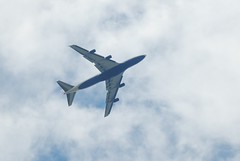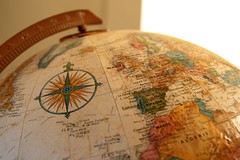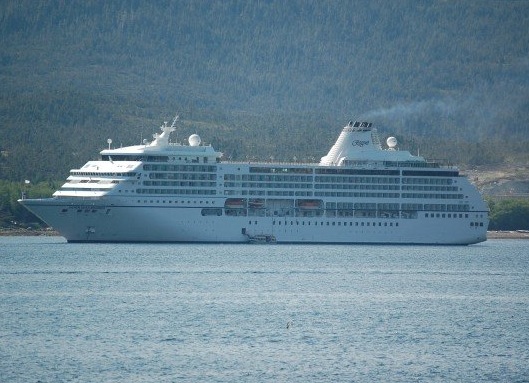 Have you ever thought about traveling internationally for several months or longer? Perhaps for a gap year, a career break, or just an extended vacation? Long multi-country trips like this are usually called “round-the-world” trips, or RTW for short.
Have you ever thought about traveling internationally for several months or longer? Perhaps for a gap year, a career break, or just an extended vacation? Long multi-country trips like this are usually called “round-the-world” trips, or RTW for short.
I’ve never traveled more than two and a half weeks at a time, but I would love to go for longer someday. While you can piece together your own flights through online discounters like Expedia or Travelocity, companies such as AirTreks specialize in arranging these types of RTW trips for travelers. Nico Crisafulli of AirTreks was kind enough to answer these questions for me about how to know if you need RTW tickets, how far in advance you should start planning, how to create an itinerary, and much more.
Emily Gerson: Can you please give me a brief description of what Airtreks does?
Nico Crisafulli: Well, AirTreks isn’t quite a consolidator and isn’t quite a bucketshop. We’re closer to a specialty or niche travel agency, one that arranges complex multi-stop and RTW itineraries for international travelers. We’re a group of travel consultants and staff that give our customers a booking experience that very few others places can provide, with expertise, patience and customer service. AirTreks has been around for nearly 25 years so we know the industry landscape very well. We can get people anywhere they want to go cost-effectively and efficiently, with a fully-staffed customer service department should something go wrong.
EG: What are the benefits of using a company like Airtreks to purchase RTW flights rather than just buying individual tickets on a site like Orbitz?
NC: It certainly is possible to buy an around-the-world ticket on your own; the DIY movement is a strong one. But there are some pretty costly drawbacks to this method and the devil truly is in the details. For example, someone may not know about airport minimum connection times or onward ticket requirements, resulting in either missed flights or denied boarding. These rules vary from airport to airport and country to country, so a lot of research would be required to keep up on it all. We also have a knowledge of combination fares that may allow for additional stops or more direct and even cheaper flights.
We take all these things into consideration when putting together itineraries so we can give our clients a better trip with fewer problems than if they had done it themselves. When you book your own tickets, you tend to settle with what you think is best whether it’s true or not.
Also, when you search for cheap one-way tickets online, it means countless hours in front of a computer screen comparing and contrasting products and routes. Some people don’t mind it, but we’ve found that most people would rather not subject themselves to that. And when you buy online, it’s not always easy to know who’s taking your credit card, who’s issuing your tickets, and who to call if you have problems on the road. Simply stated, you end up with no recourse to your tickets, your money or your security. RTW travel is already fraught with difficulties that can complicate your life or ruin your day.
 EG: Is there more than one type of round-the-world ticket?
EG: Is there more than one type of round-the-world ticket?
NC: In general, there are three kinds of RTW tickets: the ones the airline alliances sell, the ones people do on their own, and the ones AirTreks sells. The alliances’ RTW tickets (Star Alliance, etc.) are usually rife with rules and limitations and end up costing the most out of the three. The DIY method may be the out and out cheapest option, but also has some serious pitfalls, as mentioned above. Then comes the AirTreks ticket, which will save you money and restrictions over the alliances and give you reassurance and security over the DIY ticket. People should study up on their options before they dive into something they heard once was best. A couple extra hundred dollars spent may be very well rewarded.
EG: Is there a certain time length of travel that makes the most sense for purchasing RTW tickets? For example, does it make sense for someone traveling for two months, or is it only practical if you’re traveling 6+ months?
NC: This is an excellent question. And it really depends on what you want to do. If you have a huge list of places you must hit on your trip, you should probably give yourself the time to do it. It’s been said over and over that slowly is the best way to travel, and if you have seven or eight countries you want to explore, two months simply won’t cut it.
Our advice is to give every world region at least a month to see it right. If you don’t have that much time, better to leave that which you can’t devote the time to for another trip. You’ll be much happier with the places you do get to see because it allows for more authentic experiences. It’s absolutely possible, and common, to travel “around the world” in two months, it’s just better to limit the number of places you go. Some people swear by whirlwind trips, but to get the most out of the travel experience (and your money) our opinion is to treat the trip more as an aromatic summer breeze than a whirlwind.
EG: What is the basic process for booking RTW fare?
NC: As far as AirTreks is concerned, there are three steps in the standard booking process.
1) Visit Trip Planner: You arrange your most desired RTW itinerary on our TripPlanner application (most people do it this way) and get a price range for your route. People usually try several combinations before they decide on one. You then submit it via the application. One of our travel consultants will then get back to you within 24–48 hours by phone or email to discuss your choices.
2) Hone your itinerary: Once the process is started, this is the time to get it exactly as you want. People work with their travel consultant as a “point person” to ask questions about things like alternative routes, fares and our other products. Usually this process takes one to two weeks.
3) Finalize: After you’ve spent time refining your itinerary and everything is good to go, you will email or call with your final travel dates and passport names. Once you request a booking, full payment is due simultaneously, either online or over the phone. We then issue the tickets for the trip and email the e-tickets.
EG: How far in advance should people book RTW travel?
NC: We say the best time to pull the trigger is about four to six months prior to the travel date. This gives people the best chance of getting the least expensive ticket. There are a couple reasons why. A good lead time gives you the advantage over other people who wait to start shopping for tickets. You can get the dates you want. Especially if you’re planning on traveling in a peak season (the holidays or summer months), you’ll get your pick of the most coveted dates. Much of the AirTreks purchasing method comes with being able to find discounted seats on flights. And of course, like all cheap things, discounted seats are usually the first ones to go. To help our clients with the process we put together a complete planning timeline. You can find it here.
EG: How much room should people leave for spontaneity? I know some people are worried about over-committing themselves in case they end up wanting to stay one place longer.
NC: We absolutely encourage spontaneity–it allows for some of the best traveling experiences, which is why we allow overland travel and date changes. Sure, some of our clients like to have every leg of their trip settled before they leave the house, but other people want to have the freedom to go where the wind takes them. The nice thing about an AirTreks ticket is that it gives the best of both worlds.
Our suggestion is for people to book the long-haul flights (more than five or six hours) ahead of time, flying into one part of a region and out of another, for example into Saigon and out of Bangkok. This allows for a great deal of spontaneity within Southeast Asia and still lets you meet the onward ticket requirement ahead of time. Plus, long-haul flights are the hardest, most expensive ones to get on the fly, so it just makes sense to have them booked before you leave. Date changes usually do incur a fee, however, so we recommend people make good choices on travel dates before they book their tickets and limit the number of changes they make.
EG: What are some tips for selecting a RTW itinerary? What are some of the major factors to consider?
NC: We totally understand that choosing places to go can be the hardest part of any trip planning experience. We have a whole section devoted to this in our website’s planning section. We think it’s best to determine your “traveling personality,” or how you like to travel, ahead of time. We list the personalities as Adventurous, Romantic, Intellectual, First-timer, and Danger Junkie. These five typically encompass everyone, but also you can be more than one, which is perfectly okay. There are places that fit into each of these personality categories pretty easily. Then we ask them to list out their “must-see” destinations with their personality in mind, plug them into TripPlanner and see if their budget allows for that trip. If so, add in your “like-to-go” places. If not, start rearranging, editing and cutting. TripPlanner is cool because it lets you play with different routes and prices before you ever even talk to anyone.
It also helps to be super realistic about your lifestyle. If you’ve never liked camping at home, you probably won’t enjoy the rugged 12-day trek up to Everest Base Camp.
EG: Any other good tips about RTW flights?
Some of the biggest obstacles people have about doing a RTW trip is it’s too expensive and takes too long, a commitment a lot of people don’t end up making. But then they’ll spend the same if not more money taking a two-week vacation that may not end up as enjoyable as the alternative.
Long-term traveling, especially round-the-world traveling, is a perspective-altering and life-changing endeavor. It can seriously change the way you look at the world, and life in general, forever. It’s something we at AirTreks wholeheartedly encourage, not just because it’s our business, but because of the benefit it gives to humanity as a whole. How can that not be something to endorse?
![]() photo credit: Fuzzyyol
photo credit: Fuzzyyol
![]() photo credit: byJoeLodge
photo credit: byJoeLodge




